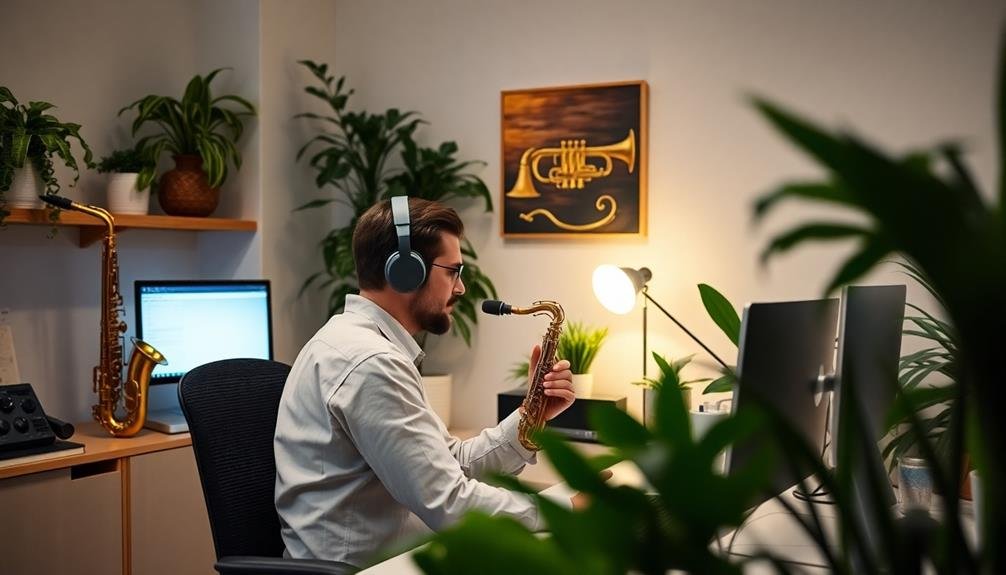When workplace anxiety strikes, you'll find relief in specific types of music designed to calm your nerves and boost your focus. Classical melodies, especially from composers like Mozart and Bach, can soothe your mind with their harmonious tones. Nature sounds and ambient music create a peaceful backdrop, masking distracting office noise. Instrumental jazz engages your brain without overwhelming it, aiding concentration. For a more targeted approach, try binaural beats or brainwave entrainment to synchronize your mind to a calmer state. Creating personalized playlists tailored to your anxiety triggers can be a game-changer in managing stress throughout your workday. Dive deeper to discover how each musical style can transform your work environment.
Classical Melodies for Stress Relief

Classical music's calming effects can be a powerful antidote to workplace anxiety. When you're feeling overwhelmed at work, turn to compositions by Mozart, Bach, or Beethoven to soothe your nerves. These timeless pieces often feature slow tempos and harmonious melodies that can lower your heart rate and reduce stress hormones.
Try incorporating instrumental classical music into your daily routine. Start your morning with gentle piano sonatas to set a peaceful tone for the day. During lunch breaks, listen to orchestral works to refresh your mind and prepare for the afternoon ahead.
When tackling complex tasks, opt for Baroque music, known for its ability to enhance focus and productivity.
Don't limit yourself to well-known composers. Explore lesser-known classical artists or contemporary classical pieces that resonate with you. Create a personalized playlist of your favorite calming classical tracks, making it easy to access when anxiety strikes.
Nature Sounds and Ambient Music
While classical compositions offer a traditional approach to stress relief, nature sounds and ambient music provide a different path to tranquility in the workplace. These auditory experiences can transport you to serene environments, even when you're surrounded by office chaos.
Nature sounds like gentle rainfall, ocean waves, or forest ambiance can lower your heart rate and reduce stress hormones. They create a soothing backdrop that masks distracting office noises, helping you focus on your tasks. You'll find that the rhythmic patterns of nature sounds can regulate your breathing and promote a sense of calm.
Ambient music, characterized by its atmospheric and non-intrusive qualities, complements nature sounds perfectly. It often incorporates elements of natural soundscapes with subtle melodies and textures. This genre is designed to enhance your environment without demanding your full attention, making it ideal for maintaining concentration at work.
To incorporate these sounds into your workday, try using noise-canceling headphones or a small speaker at your desk. Many streaming platforms and apps offer curated playlists of nature sounds and ambient music.
Experiment with different combinations to find what works best for you, and you'll likely notice a significant reduction in workplace anxiety.
Instrumental Jazz for Focus

Instrumental jazz offers three key benefits for workplace focus: complexity, rhythm, and adaptability. The intricate layers of jazz music engage your brain without overwhelming it, allowing you to concentrate on tasks while still enjoying the music.
The rhythmic patterns provide a steady backdrop for your work, helping you maintain a consistent pace throughout the day.
Jazz's adaptability means you can find the right sub-genre to match your mood and workload. Smooth jazz can calm your nerves during high-stress periods, while more upbeat bebop can energize you during afternoon lulls.
You'll also find that instrumental jazz lacks lyrics, which can be distracting when you're trying to focus on complex tasks or written work.
Consider creating a playlist of jazz standards, cool jazz, or modal jazz to suit your work environment. Artists like Miles Davis, John Coltrane, and Bill Evans offer extensive catalogs of instrumental works.
As you become more familiar with jazz, you'll discover which styles and musicians best complement your work rhythm and help alleviate anxiety in the workplace.
Binaural Beats and Brainwave Entrainment
Have you ever wondered how sound can directly influence your brain's activity? Binaural beats and brainwave entrainment offer a unique approach to managing workplace anxiety through auditory stimulation. These techniques use specific sound frequencies to synchronize your brainwaves with desired mental states.
When you listen to binaural beats, each ear receives a slightly different frequency, and your brain perceives the difference as a pulsating rhythm. This can guide your brainwaves into patterns associated with relaxation, focus, or creativity. For workplace anxiety, delta (1-4 Hz) and theta (4-8 Hz) frequencies are particularly beneficial, promoting calmness and reducing stress.
Brainwave entrainment extends beyond binaural beats, incorporating techniques like isochronic tones and monaural beats. These methods can be more effective for some individuals and don't require headphones.
To use these tools effectively, choose tracks designed for anxiety relief and listen for 15-30 minutes during your workday. You'll find various apps and online platforms offering binaural beats and brainwave entrainment, making it easy to incorporate this science-backed method into your anxiety management routine.
Personalized Playlists for Anxiety Management

Creating a personalized playlist tailored to your specific anxiety triggers and preferences can be a powerful tool for managing workplace stress. Start by identifying the types of music that resonate with you and help you feel calm. Consider various genres, from classical and ambient to acoustic or even nature sounds. Experiment with different tempos and rhythms to find what works best for your anxiety levels.
Include songs that evoke positive memories or emotions, as they can serve as anchors during stressful moments. Don't shy away from instrumental tracks, as they can be less distracting when you need to focus. Pay attention to lyrics, choosing uplifting or motivational messages that align with your goals.
Organize your playlist strategically, starting with more energetic tracks to boost your mood, then shifting to calmer selections for sustained relaxation. Update your playlist regularly to prevent boredom and maintain its effectiveness.
You can create multiple playlists for different scenarios, such as one for intense focus and another for unwinding after a challenging meeting. Remember, your personalized playlist should evolve with your needs and preferences, serving as a reliable companion in managing workplace anxiety.
Frequently Asked Questions
Can Listening to Music at Work Negatively Impact Productivity?
Yes, listening to music at work can negatively impact productivity. It may distract you, decrease concentration, and hinder complex tasks. However, the effects vary depending on the type of music and your personal preferences. Consider your work requirements carefully.
How Loud Should Workplace Music Be to Reduce Anxiety Effectively?
You'll want to keep workplace music at a moderate volume. It should be audible but not distracting. Aim for a level where you can hear it comfortably without straining, but it doesn't overpower conversations or your thoughts.
Are There Specific Genres to Avoid When Trying to Alleviate Workplace Stress?
You'll want to steer clear of genres like heavy metal, hard rock, or intense electronic music. These can increase stress levels. Instead, opt for calming genres like classical, ambient, or soft jazz to reduce workplace anxiety.
How Often Should Employees Take Music Breaks During the Workday?
You should take music breaks every 60-90 minutes during your workday. These short 5-10 minute breaks can help refresh your mind, boost productivity, and reduce stress. Don't forget to use headphones if you're in a shared space.
Can Music Preferences for Anxiety Relief Vary Based on Job Type?
Yes, your job type can influence music preferences for anxiety relief. You'll find that office workers might prefer calming classical, while manual laborers often opt for upbeat tunes. It's crucial to choose what works best for your specific role.
In Summary
You've got a variety of options to ease your workplace anxiety through music. Whether it's soothing classical tunes, calming nature sounds, or focused jazz instrumentals, there's something for everyone. Don't forget to explore binaural beats for potential stress relief. Remember, what works best is personal, so create your own anxiety-busting playlist. Experiment with different genres and styles to find your perfect musical remedy. With the right tunes, you'll be tackling work stress in no time.





Leave a Reply